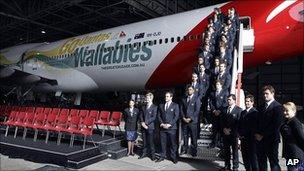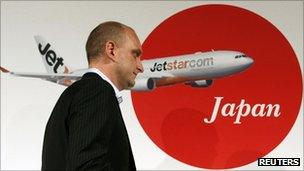Qantas and the Asiafication of Australia
- Published
- comments

Qantas sponsors national sports teams, like the Wallabies, the Socceroos and Australia's Olympians
Few private companies engender quite the same sense of public ownership as Australia's national flag carrier, Qantas.
The airline has encouraged this, of course, with its sentimental advertisements featuring the Peter Allen hit, I Still Call Australia Home, and its sponsorship of national sports teams, like the Wallabies, the Socceroos and Australia's Olympians.
When Cadel Evans recently made his homecoming to Melbourne after winning the Tour de France, Qantas mounted a sham photo opportunity timed to coincide with the breakfast news shows that showed him coming down the steps of a parked Airbus A380, even though he had actually touched down on another plane earlier in the morning.
Now Qantas stands accused of a much more egregious pretence: of planning to use Australia not so much as a home but as a lay-over. It follows the announcement of a corporate-restructuring that will see the expansion of the airline's operations in Asia, big changes to its struggling international operations and the loss of 1,000 jobs from its 35,000-strong workforce.
Qantas plans to launch two Asia-based airlines, including a budget airline operating out of Japan. It has not decided where to base its other so far nameless joint-venture, though Singapore and Kuala Lumpur are potential hubs.

Qantas plans to launch two Asia-based airlines, including a budget airline operating out of Japan
The airline, which made a healthy pre-tax profit on the back of its domestic routes, says it has no other choice because its international operations are set to lose $A200m ($208m, £126m). It has been hit by short-term factors like high fuel costs and natural disasters, including volcanic ash clouds.
But it faces long-term structural challenges. Australia's open skies policy has seen the expansion of Middle Eastern and Asian carriers, like Emirates and Singapore Airlines, which has eaten into its market share.
The announcement has inflamed parliamentarians. "I think it's official, Qantas can no longer call Australia home," said Senator Nick Xenophon.
Queensland MP Bob Katter - he of the 10-gallon hat - went further, sounding like a furious passenger who had just arrived at the end of a 23-hour flight to London only to discover that his luggage was in Sao Paulo.
"The people that make these decisions in Sydney are the slithering suits, as I call them, but for a bunch of brainless bastards there'd be few people in the world that would compare with them."
Like I say, the very word Qantas - which started life as the Queensland and Northern Territory Services Limited - unleashes strong passions.
The Spirit of Asia?
Lawmakers are now combing through the Qantas Sales Act, the legislation that brought about the airline's privatisation in the 1990s, to see if the restructuring violates the clause ruling that the airline needs to maintain Australia as its operational base.
Meanwhile, the unions are bemoaning what they are calling the offshoring of Australian jobs, even though the airline says that the 1,000 posts are disappearing rather than being relocated elsewhere.
For our purposes, the restructuring of the airline is interesting for what it says about the globalisation of the domestic economy and the continuing Asiafication of Australia. Others have written that Qantas's famous motto The Spirit of Australia should now read The Spirit of Australasia. But perhaps the airline should even go further and paint The Spirit of Asia on its planes.
For Qantas chief executive Alan Joyce this is simply a case of chasing an emerging market. Over the next 20 years, 16% of the world's middle-class will be in East Asia.
"China may already have the world's fourth-largest population of millionaires, and India the 12th," he said. "There are many, many millions of premium travellers in waiting."
By 2014, the Asia-Pacific region will account for a third of global air traffic - up 26% from now.
Tellingly and symbolically, Qantas has cut two unprofitable routes to London, operating out of Bangkok and Hong Kong - another indication of Australia's reorientation.
The competition that Qantas now faces from airlines like Emirates also speaks of the opening up, deregulation and globalisation of the Australian economy.
Why, Etihad, the Gulf-based airline, even has naming rights on Melbourne's indoor Docklands stadium. Also gone are the days when Qantas had a near stranglehold on the lucrative trans-Pacific route. It was a duopoly shared with the American carrier United. Signed in 2008, the open skies agreement between Washington and Canberra ended all that.
As people will have noticed during Alan Joyce's media blitz this week, Qantas is also run by an Irishman, just as Telstra, the telecommunications giant, was run up until recently by an American. Again, it speaks of the internationalisation of Australian corporate life. ANZ, one of the main banks, is run by a Brit. Westpac is run by Gail Kelly, an Australian of South African descent.
Many aviation specialists believe that Qantas has brought many of its problems on itself, through bad decision-making.
Geoffrey Thomas of Air Transport Journal told the ABC's The World Today: "One of the reasons they've lost so much market share into this country is because they were the last major airline to put seat-back videos into economy, they didn't choose the right aeroplanes, and they were one of the last airlines to put premium economy into their aircraft despite the fact that Australians are the second-tallest people in the world flying the longest distances."
But many aviation specialists believe that the airline has no other option but to expand into Asia if it is to remain viable as an international operator.
Paul Keating once said that if Australia could not succeed in Asia it could not succeed anywhere. Evidently, the same now is true of Qantas.